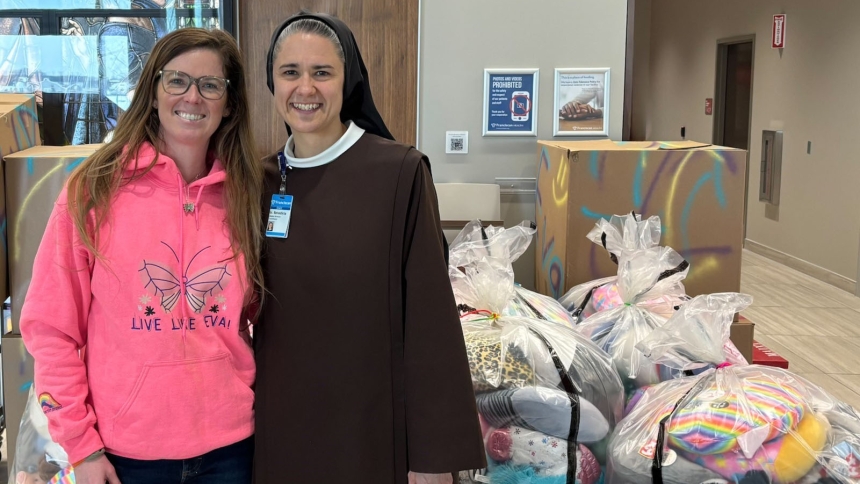
As published in the Northwest Indiana Catholic on December 3, 2016
This Sunday’s Scripture readings mention the glory of God in both the prophecy of Isaiah and Paul’s Letter to the Romans. The word “glory” is all over the Bible, the prayers of Mass and the Liturgy of the Hours. Biblical figures glorify the Lord; the glory of God fills the Temple in the vision of Isaiah; we sing the Gloria at Mass; we pray to experience the glory of heaven.
What exactly is glory?
“Shekinah,” a Hebrew word meaning both “glory” and “the divine presence,” appears throughout the Old Testament whenever God shows the wonder of his revelation, whether in dialogue with Moses, dwelling in the Ark of the Covenant, appearing to the prophet Ezekiel or leading the Israelites through the desert to the Promised Land.
When people experience the glory of God, they are overwhelmed, fearful, trembling and often fall to the ground in awe. In the Jewish view, no one can see God directly and live, but the Lord would reveal his glory, his shekinah, as a way for them to come close.
Another Hebrew word that speaks of divine glory is “kavod,” closely related to “kaved” which means “heavy” or “weightiness.” Here again, we see the glory of God as a mysterious reality which breaks into human experience as a transforming, intense, transcendent and awe-inspiring presence.
Think of Peter when he makes the miraculous catch of fish and falls at the feet of Jesus, John on Mount Tabor when he encounters the transfiguration of the Lord, Mary at the moment of the Annunciation or Stephen when he sees the heavens open up and the Son of Man seated at the right hand of the Father.
Can we not say then that the glory of God is the light, power, love, grace, mercy and joy that radiate from the very being of the Divine Mystery? Although the people of the Old Testament could not look upon God and live, the coming of the Lord in the human flesh of Christ, the Son of God, enables us to gaze upon the face of Jesus and encounter there the fullness of God’s presence and glory, inextricably bound up in our own human flesh and earthly reality.
Since we cannot fully experience God in the pure essence of his unapproachable divinity, he pours his glory and life upon the Son, who is both human and divine, so that we can find him in Jesus. This desire of God to fully reveal himself captures the meaning of Advent and Christmas.
Where have you and I experienced the weight and the light of the shekinah, the mysterious divine presence? Sometimes, I find it helpful to write my encounters of the glory of God in a journal and then go back to them, sometimes years later. Such memories often serve as signposts on the curving and mysterious path to the Kingdom of God.
Knowing without the shadow of a doubt that I met the Lord here in that person or there in that moment consoles me in those inevitable times of trial, temptation and doubt. Where does the shekinah dwell in your home, family, marriage, workplace and heart?
I remember particular encounters in the sacrament of reconciliation when I confessed something heavy and difficult, feeling the burden lifted by the extraordinary mercy of God. Sometimes, when I am consecrating the bread and wine at Mass, I feel the glory of God manifest in the Eucharist as both weight and light, the shekinah radically present in both the sacred species on the altar and the People of God gathered around in prayer.
Conversations with thousands of people throughout my life in which individuals shared their deepest hopes, struggles, sins and joys, revealed the wondrous presence of the Holy Spirit working in varied ways in so many lives. Once in a while, I feel the kavod of the Lord’s presence in prayer, when my restless thoughts, inadequate words and fleeting emotions fall away, even for just a few seconds, and I encounter the depths of God in the silence and darkness of my fragile, quavering soul. Walking in the woods on a sunny autumn day, hearing only a gentle wind and crackling leaves under my feet, wrapped in the mystery of God’s world is another glorious moment.
What are your shekinah experiences when God was so close, you could have touched him or you felt the nearness of the divine breath? Write them down.
Saint Paul reminds us that we are created to glorify God, to refract back, as if in a mirror, the love, mercy, grace and joy we have come to know so that others, too, can encounter the glory of the Lord and live in the practice of faith and good works. We glorify and praise God when we increasingly become the saints who he called us to be from the beginning. As St. Irenaeus said, “The glory of God is the human person fully alive!”
At the end of his first trip to Mexico in 1979, Saint John Paul II boarded his plane in Mexico City and took off for the return flight to Rome. As the plane ascended, he looked down and saw an astonishing ocean of light! The tens of thousands who had gathered to see him off brought along mirrors, holding them to the sun as a gesture of final farewell. The pope was moved to tears.
Maybe, that is what it means to glorify God: to hold our lives up to the light, as a mirror to the sun, reflecting back the mercy, love and peace that we have received.
We hold this treasure in earthen vessels.
+ Donald J. Hying



